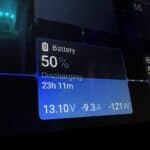
MENUMENU
TALK TO AN EXPERT
Special Hours: 7AM – 6PM PST
TALK TO AN EXPERT
Special Hours: 7AM – 6PM PST
When you’re out on the open water waiting for that next big catch, the last thing you want to worry about is your boat’s batteries. Important standards crafted by the American Boat and Yacht Council (ABYC) recently went into effect to ensure your boating adventures stay safe and reliable.
The ABYC E-13 Standard was ratified last year and covers the installation of lithium batteries on boats. The goal is to prevent electrical hazards that could put you and your passengers at risk. New recommendations for E-13 are now in effect, so it’s crucial to know what’s required.
Let’s review what you need to know about the newly implemented standards and look at compliance best practices.

Some people avoid upgrading to lithium batteries for their boats because of concerns about obtaining insurance coverage. The new ABYC standards address this issue by acting as a reference point for safety requirements.
These guidelines and recommendations ensure the safe and effective use of lithium batteries in marine applications. If you plan to switch to lithium batteries on your boat or yacht, understanding this standard will help you prioritize both safety and compliance.
Here are some key components of these standards:
The ABYC E-13 Standards aim to maximize the efficiency of a lithium battery setup. Consult an expert who’s well-versed in these standards to guarantee a safe and reliable power source for your boat.
First, we had the TE-13, which was just a technical note that gave a preview of the ABYC Standards. This created confusion for insurance providers, as there was no set standard.
The ABYC E-13 was ratified as a standard back in 2022, but the new recommendations for E-13 only went into effect on July 13, 2023. The standard applies to lithium power systems with 600 watt-hours (Wh) or greater capacity.
An important point to note is that these standards are voluntary. But most insurance companies look to them for guidance when they approve policies.
Here are seven updates and changes you need to know:

Adhering to ABYC Standards is not only important for insurance purposes; it also helps you get more performance out of your batteries. Use these tips and best practices to make sure you comply.
First, consider an LiFePO4 (lithium-ion) battery. It runs longer, charges faster, and performs better than its lead counterparts. These batteries are compact and can fit in small, inconvenient spaces. What’s more, Battle Born Smart LiFePO4 batteries make it easy to design an ABYC-compliant power system.
Next, follow the installation guidelines provided in E-13 meticulously. The batteries must be installed securely and have protection from water exposure. ABYC has certified more than 3,000 technicians who can guide you through the installation.
Another best practice is to have an alarm system. When using Battle Born products equipped with Dragonfly IntelLigence™ technology, the alarm signal can be wired into the boat as a flashing light, audible noise, or simply set up as a push notification on your phone.
Finally, you should also ensure proper ventilation and insulation. Install over-current protection and thermal runaway protection devices, and regularly monitor battery performance and health. Always conduct routine inspections to check for any signs of damage, corrosion, or loose connections.
Safety is the biggest benefit of meeting ABYC Standards. They’re specifically designed to prevent accidents such as fires. As a result, they significantly reduce the risk that can come with installing marine batteries. This also lowers your liability in the event of an accident.
With compliance, you can enjoy an extended battery life as well. For instance, the all-new Battle Born smart LiFePO4 batteries equipped with Dragonfly IntelLigence™ technology follow the E-13 guidance on proper charging and monitoring. This can actually increase the lifespan of your batteries and reduce the need for frequent replacements.
Knowing that your boat’s power system is compliant with industry standards can give you peace of mind. Enjoy your time on the water with confidence in your boat’s safety and performance.

Don’t let inferior batteries hinder your sailing adventures. Following the new ABYC E-13 Standards is now a must for the safety and longevity of your electrical systems. It also optimizes the performance of your batteries and is environmentally responsible.
Battle Born Smart LiFePO4 batteries equipped with Dragonfly IntelLigence make it easy to have an E-13-compliant power system. They offer superior performance and safety features along with proper BMS system and monitoring. You can count on reliable power when you need it, whether for propulsion, navigation, or onboard systems. Through the Battle Born mobile app, you can monitor your entire power system, receive push notifications for critical alerts, and even shut down the system when needed.
Contact us now to upgrade your boat’s power system to the lightweight, durable, and safe LiFePO4 batteries.
Shop Best Sellers








Ask a technical specialist now at 855.292.2831
Stay in the Know